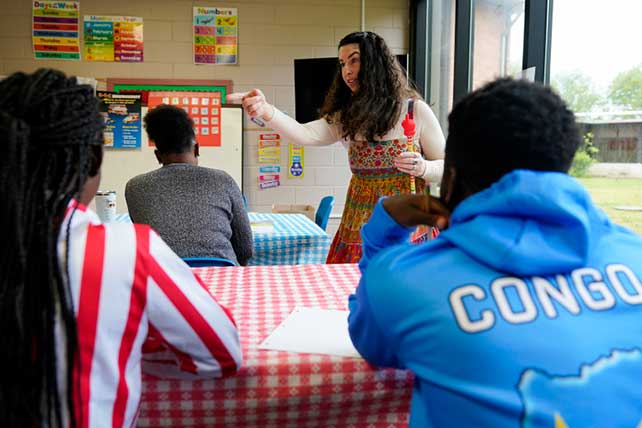The Minnesota Council of Churches, an affiliate of the Episcopal Migration Ministries, another of the 10 national resettlement agencies, connected the family with the interfaith coalition in Stillwater. Federal funding covered six months of rent and a $250 monthly allowance for the family, who also received clothes and furniture donations from members of the three congregations.
People evacuated from Kabul, Afghanistan, wait to board a bus after they arrived at Washington Dulles International Airport, in Chantilly, Va., on Aug. 25, 2021. (AP Photo/Jose Luis Magana)
The team focused its efforts on the two primary obstacles immigrants face, according to Carlsen: language and transportation. A coalition member donated a car to the family, while another offered driving lessons. Members of the mosque who spoke Urdu served as interpreters and the family was enrolled in English classes.
Today, with the help of the team, the father works as a nurse and the mother works in the food service industry. A year after their arrival, the family obtained permanent residency with the help of a lawyer working pro bono. They are currently saving to buy a house.
The coalition is now working with other families, and despite the uncertainty created by Trump’s order, the members’ faith has convicted them to find a way forward.
“We will continue this work. It’s just a question of what it will look like and what kind of resources we have to bring to bear. But we’ll do everything we can,” said Parker.
In Pittsburgh, JFCS’ Smith-Tapia hopes more faith groups such as Temple Sinai and Shadyside Presbyterian will join JFCS in serving immigrants and refugees. Currently, JFCS is working to support the 76 refugees who arrived between November and January who had been relying on federal funds to make western Pennsylvania their home.
“I wish that in this moment, more faith-based organizations will feel that they would like to make that commitment,” said Smith-Tapia. “Regardless of their specific denomination or religion, we all share this common understanding that we care for each other, that we believe in our shared humanity, that we care about the most vulnerable.”
This article originally appeared here.


